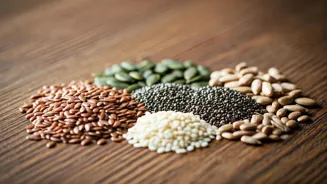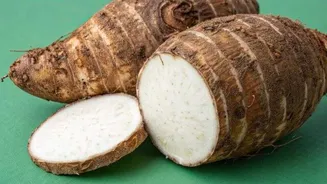Seeds: Powerhouses
Seeds are often overlooked, yet they are packed with essential nutrients that can significantly enhance your health. Incorporating seeds into your diet
is an excellent way to boost your intake of healthy fats, fiber, protein, vitamins, and minerals. These tiny treasures offer a multitude of benefits, from promoting heart health to aiding digestion and boosting energy levels. This exploration of six exceptional seeds will reveal their individual advantages, demonstrating how each contributes to a balanced diet. Learn how these seeds can be easily included in your regular desi meals.
Chia Seed Wonders
Chia seeds are nutritional dynamos, celebrated for their impressive omega-3 fatty acid content, along with fiber and antioxidants. Omega-3s are crucial for brain health and reducing inflammation, while fiber aids digestion and promotes feelings of fullness, supporting weight management. Antioxidants found in chia seeds protect the body from damage caused by free radicals. For your desi meals, chia seeds can be sprinkled over yogurt, mixed into smoothies, or added to your rotis and parathas. They can also be used as a thickener in chutneys or added to ladoos to create a healthier version.
Flax Seeds' Goodness
Flax seeds are another source of omega-3 fatty acids and fiber, which are crucial for cardiovascular health. They also contain lignans, plant compounds that have antioxidant and hormonal balancing properties. These seeds are easily accessible and incredibly versatile for desi cuisine. Ground flax seeds can be added to your atta for chapati or paratha, providing an extra dose of nutrition. You can also blend them into your favorite dals or vegetable curries, enriching your meals without altering the taste significantly. Another option is to add flax seeds to raita or sprinkle them on top of salads.
Sesame Seeds' Appeal
Sesame seeds are rich in calcium, iron, and magnesium, vital minerals for bone health, oxygen transport, and muscle function. They also offer a good source of vitamin E, an antioxidant that defends cells against damage. Sesame seeds are widely used in many desi dishes, known for their nutty flavor and slight crunch. You can toast them and sprinkle them on top of your sabzis or add them to your dal tadka. Sesame oil, a popular ingredient in many Indian kitchens, can also be used for cooking to add a touch of flavor and nutritional value.
Pumpkin Seeds' Benefits
Pumpkin seeds, also known as pepitas, are a fantastic source of zinc, which is crucial for immune function and wound healing. They are also high in magnesium, supporting nerve function and blood sugar control. These seeds offer a satisfying crunch and a mild, nutty taste. Add them to your daily diet by using them in salads, or sprinkle them on top of your vegetable dishes. Pumpkin seeds can also be roasted and enjoyed as a snack, or ground and added to your chutney for a nutritional boost.
Sunflower Seeds
Sunflower seeds are filled with vitamin E, selenium, and healthy fats, known for their antioxidant and anti-inflammatory properties. Vitamin E, in particular, helps protect cells from damage. These seeds have a delightful, subtle flavor that works well in many dishes. Add sunflower seeds to your diet by sprinkling them onto your salads, or by adding them to homemade trail mixes. You can also incorporate them into your curries or use them as a topping on your breakfast cereal.
Melon Seeds' Value
Melon seeds, often discarded, offer a surprisingly good source of nutrients. They contain healthy fats, protein, and various minerals, like magnesium and zinc. These seeds have a mild flavor and a crisp texture. Roast melon seeds and use them as a topping for your raita or add them to your chutneys. You can also experiment by adding them to your ladoos or other traditional sweets, providing a healthy crunch and a boost of nutrients.














